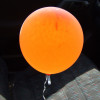How deep do you think a human has ever dived down to without a scuba tank, but just holding their breath? Well, the unofficial world record holder is Patrick Musimu, who plummeted to over 200m last year - you can watch what is apparently his record dive on You Tube on the internet. But anyway, that is nothing compared to a far superior diving mammal which has recently been announced as the new world record breaking deep diver. Cuvier's beaked whales have now been recorded as diving down to nearly 2000 metres - around 6230 feet or well over a mile. That's according to a study published by an international team of scientists lead by Dr. Peter Tyack of Woods Hole Oceanographic Institution in the United States. The team attached non-invasive digital archival tags or D-tags developed at Woods Hole to 7 cuviers beaked whales and 3 blainville's beaked whales in waters off Italy and the Canary Islands. The tags are about the size of a flip flop, and they carry a variety of underwater sensors to record sounds, depth and movements - and they are attached to the whales with four small suction cups using handheld poles when the whales visit the sea surface. The D tags are programmed to fall off the whale a day later and float on the surface where radio beacons let the researchers know where they are. The information these tags collected showed that that the Cuviers beaked whales not only achieved the deepest ever recorded dives but perhaps more importantly, on average they spent more time in greater depths than any other animals, beating the better known sperm whales and elephants seals. And what are they doing all the way down there in that dark cold water? Well, feeding of course. The D tags picked up the buzzes and clicks of the whales sonar as they hunted for prey.
One of the mysterious things the team found, was that the whales come up to the surface from these very deep dives more slowly than they do from shallow dives - now this is just what human scuba divers must do to avoid getting decompression sickness or the bends, which is when nitrogen gas that's dissolved in the blood under great pressure comes bubbling out - a bit like opening a can of fizzy drink. But for the whales it should make no difference how quickly they come up once they've gone below 100m because at that point they are under so much pressure that their lungs have collapsed and there is no more gas left in them to dissolve into the blood and so they are at no greater risk of getting the bends. And it seems that even thought these whales are serious extreme divers, this probably doesn't put them at any greater risk of being affected by underwater sonar - something that is of great concern for the survival of whales around the world. The beaked whales have been seen in mass strandings on beaches in areas where military sonar was being used - and now it's thought that the sonar may be causing these whales to make repeated shallower dives down to around 50m which would increase their risk of getting the bends.




Comments
Add a comment